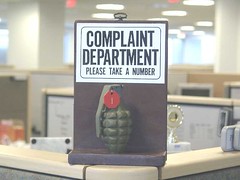Is Bad Communication Skills Killing Your Customer Service?
Posted by Mitch Mitchell on Nov 23, 2014
In my last post, where I talked about measuring competence, I shared a brief tale about trying to get a kerosene heater to work. I read the instructions again, watched a video on YouTube... nothing. After talking to my wife she said I should take it back and try another one. Though I hate doing that, I knew she was right so I went back to the store.
 Bombasticos (ClintJCL) via Compfight |
I went to the returns desk, said I did everything I could but it wouldn't work and that I wanted an exchange. Instead of just putting it through he called over a guy who supposedly knows something about the heaters and asked him what might be wrong. The guy asked me if I had tried lighting it with a match and I said no, I wasn't putting my hand inside something I didn't understand.
Then he told me that the electric igniters on kerosene heaters rarely worked. I said "Why would _________ (name of store) sell something that they knew didn't work? He looked at me for a moment, then turned around and walked back to the department to get me another heater. I looked at the returns guy, who was suddenly looking down and away and I said "That was kind of interesting, huh?" He said "Yup".
Can you imagine your employees telling people that what your business does is messed up? Actually I'm sure you can because every place I've been, whether I was an employee or a consultant, invariably has someone who doesn't like something, sometimes many things, about the company they work for, and they can't wait to tell as many people as possible about it.
The thing is it's bad enough when it's at work, but what about when it's not at work, or at least not only in front of co-workers? I hear people all the time talking about the sneaky things other employees do to cheat customers or products they sell that the owners know aren't going to work properly. I also know that's not always true, that it's just the perception of the employee.
Whose fault is this? Obviously it's the employer's fault, even though we want to blame the employee. Actually, the employee isn't without blame, but overall fault lies in leadership for more than one reason:
* leadership hasn't spent time on educating its employees on customer service
* leadership hasn't spent any time making sure that employees are treating customers properly
* leadership hasn't spent enough time teaching employees about the products and how they should work
* leadership hasn't paid any attention to complaints from either employees or customers
* leadership hasn't fully evaluated their products or processes to make sure they do what they're supposed to do
I get it; no one likes hearing complaints. Yet, sometimes they come, and let's face the fact that customers and employees aren't always wrong. Instead of having a kneejerk reaction and wanting to go after the employee, or dismissing customers are being ignorant and troublesome, maybe some time needs to be spent looking at processes and/or products. They just might be right after all; I mean, how many of you have seen the show Undercover Boss and seen how many of these leaders discover things going wrong in their companies that are their fault?
No matter how good you think your company and your product or services are, if your customer services processes aren't up to snuff, and if you don't take into serious consideration what your employees or customers are saying, you could end up with no business as consumers go elsewhere for things you offer.

